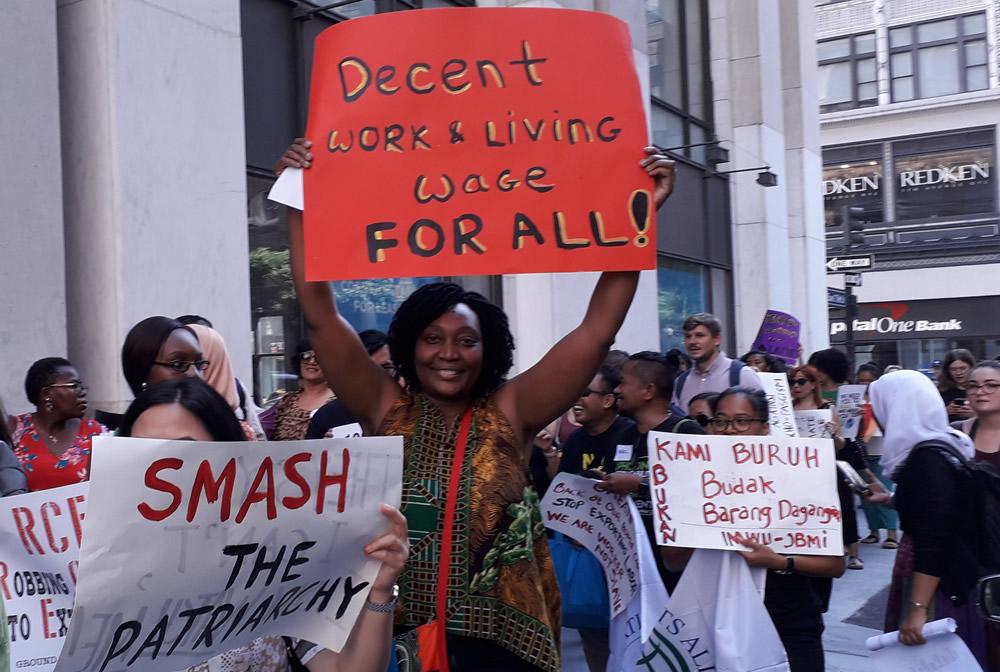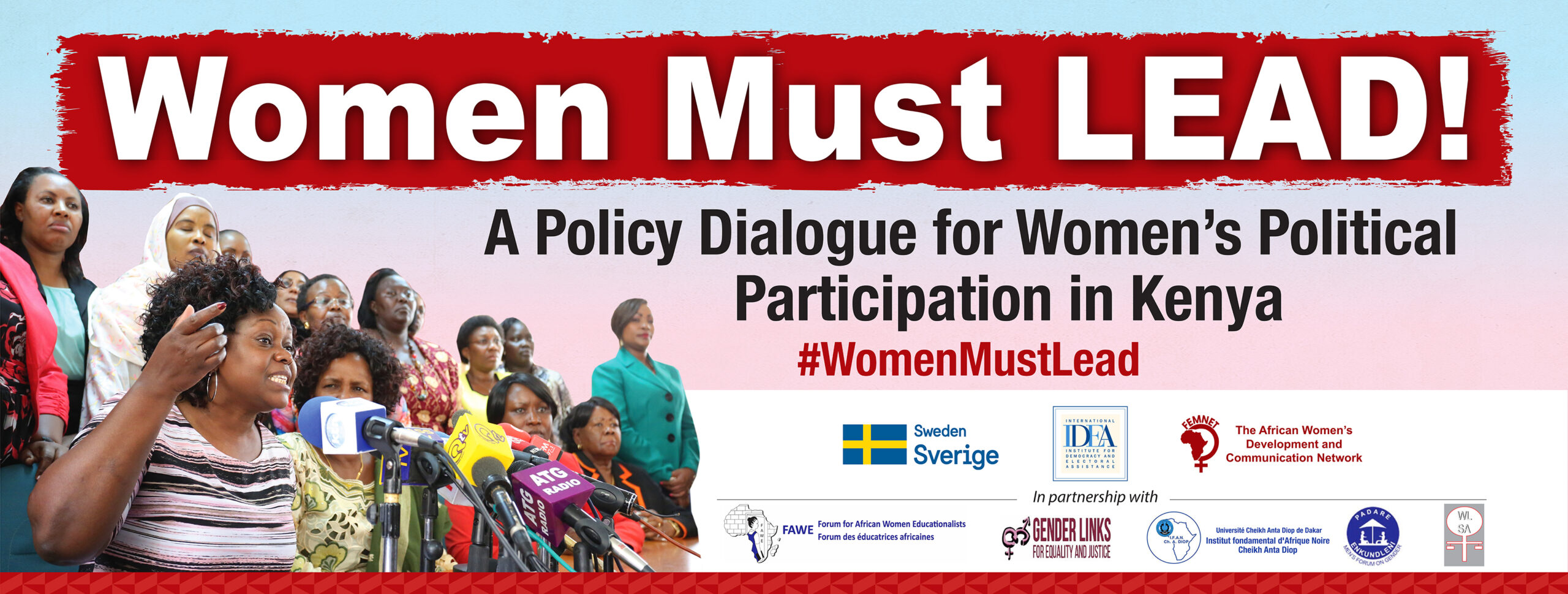
FEMNET urges more commitment to the delivery of the 2030 Agenda for Sustainable Development
New York, 19th July 2019 – The African Women’s Development and Communication Network, FEMNET alongside hundreds of women’s rights activists and social justice actors from across the globe have taken up to the streets of New York to demand greater government accountability and commitment to achieving the 2030 Agenda for Sustainable Development Goals (SDGs).
In global solidarity, activists and human rights defenders from across the world marched the streets in New York chanting messages which included “rise up, fist up, for system change” and “we are the feminists fighting for justice and liberation” and “the people united will never be defeated”. The march was organized by the Women’s Major Group under the banner of the Ground Level Peoples’ Forum (GLPF) bringing together civil society and peoples’ movements to share their struggles and resistances, and hold governments accountable for the commitments that they have made for sustainable development.
Happening at the sidelines of this year’s High Level Political Forum on Sustainable Development (HLPF) FEMNET’s Executive Director, Memory Kachambwa, while joining the March, abhorred the state of rising inequalities in the world and called for collective action across movements to challenge underlying power and vested interests that drive inequalities.
“The world is lagging behind in many dimensions and there is an urgency to accelerate progress towards our collective aspirations for a better, just, peaceful and sustainable world” said Ms. Kachambwa. “Inequalities are intensifying and are being exacerbated by regressive austerity measures such as severe public expenditure cuts and retrogressive tax reforms that have negative impacts on disadvantaged and marginalized individuals and groups such as the women, children, youth, persons with disabilities, older persons, people with HIV/AIDS, indigenous people, ethnic minorities, migrants, refugees, and the unemployed. The list on the gaps of inequalities is endless!”
“Rising inequalities hinders long-term growth” stated the UN Secretary-General, António Guterres at the opening of the Ministerial segment of HLPF adding that “development is not sustainable if it is not fair and inclusive”.
Four years into the implementation of the ambitious and promising 17 Sustainable Development Goals (SDGs), it has been ‘business as usual’ with not much progress in genuinely leaving no one behind and transforming the world as envisioned in the 2030 Agenda for Sustainable Development.
Voluntary National Reviews
This year’s HLPF held in New York (9th to 18th July 2019) under the theme “Empowering people and ensuring inclusiveness and equality” has seen 17 1 African countries present their voluntary national reviews (VNRs) of SDG implementation. Six of the 17 Goals were scrutinized and declared “off-the-track” – these include SDG 4 (equitable quality education), SDG 8 (decent work for all and inclusive economic growth), SDG 10 (reduced inequalities), SDG 13 (combating climate change), SDG 16 (promoting peaceful and inclusive societies) and SDG 17 (partnerships for the Goals).
Although, majority of these 17 African countries have citied having made their national-level VNR processes participatory and inclusive by engaging and consulting different stakeholders, marginalized and vulnerable populations continue to be left behind. A huge gap also exists in meaningful data capture and analysis that is inclusive of girls and women’s voices, experiences and realities to impact policy making and legislation.
“The reason why SDGs are off-the-track is the persistent and deeply rooted systemic and structural barriers to achieving women’s rights and gender equality. Therefore, to shift the tides and move the world closer to achieving the SDGs, a feminist agenda is urgently required – one that is entrenched in not only in policy but also in practice and institutionalized in all settings from home, workplaces, schools, hospitals, religious places and so on” says FEMNET’s Ms Kachambwa.
“The ongoing reforms must ensure that the annual HLPF space goes beyond just reporting on the SDGs to being an accountable space where countries ask critical questions on how they are dismantling systemic barriers to sustainable development,” she adds.
Data for change should be inclusive
FEMNET is calling for evidence-based decision making based on robust, inclusive, African-driven and gender sensitive data collection and analysis by national institutions responsible for the development of such data sets. This will enable effective monitoring and tracking of SDGs implementation at grassroots, national, regional and international levels. This data must include citizen-generated data that document women’s experiences and lived realities.
The future of work
The future of work amidst the fourth industrial revolution presents great opportunities to reverse long-term and severe decent work deficits, but also presents serious challenges that could increase inequalities. At HLPF 2019, the Director-General of the International Labour Organization (ILO), Mr. Guy Ryder, presented the outcome of the ILO Centenary International Labour Conference, which adopted an ILO Centenary Declaration for the Future of Work, and Convention 190 and its accompanying Recommendation to End Violence and Harassment in the World of Work in June 2019.
The Declaration is aligned with SDG 8 (decent work for all and inclusive economic growth), and calls for a human-centered approach in shaping a fair, inclusive, sustainable and secure future of work that eradicates poverty and leaves no one behind
The new treaty (Convention 190) obligates Governments to develop and institutionalize policies that prohibit workplace harassment and violence as well as monitor, take preventive measures and provide remedies that facilitate safe and conducive workplaces that are free of any and all forms of violence and harassment, particularly for those working in precarious jobs and marginalized populations of the world’s labor force, including global supply chain workers, informal workers, migrant workers, domestic workers and others.
FEMNET calls on African governments to unanimously ratify and domesticate the new ILO Convention on Ending Violence and Harassment in the World of Work.
For more information and/or to request for an interview, please contact:
FEMNET’s Head of Communication, Mildred Ngesa: m.ngesa@femnet.or.ke
Tel: +254 727137853
Follow and engage online using hashtags #FeministDemand, #HLPF2019 @FemnetProg
About FEMNET:
The African Women’s Development and Communication Network (FEMNET) is a pan- African membership-based feminist network based in Nairobi with over 650 members across 48 African countries. FEMNET envisions an African society where gender equality is achieved and women and girls enjoy their rights and dignity while in its mission it seeks to facilitate and coordinate the sharing of experiences, ideas, information, and strategies for human rights promotion among African women’s organizations through networking, communication, capacity-building and advocacy at the regional and international levels. Since its inception in 1988, FEMNET has played a leading role in building the women’s movement in Africa and ensuring that women and girls’ voices are amplified, and their needs, priorities, and aspirations are prioritized in key policy dialogues and outcomes that have direct and indirect impact on their lives. For more visit our website www.femnet.org
Related Tags
Related Posts
“Women Must LEAD! We need feminist leadership in Kenya”
Press Statement For Immediate Release: Nairobi, 29th August 2020 Ten years after the promulgation of the Constitution of
Learn MoreAn Appeal to African Leaders: Support Gender Equality in the Sustainable Development Goals Without Reservations
24th September 2015 For Immediate Release On the eve of the adoption of the landmark Post-2015 Development Agenda
Learn More
